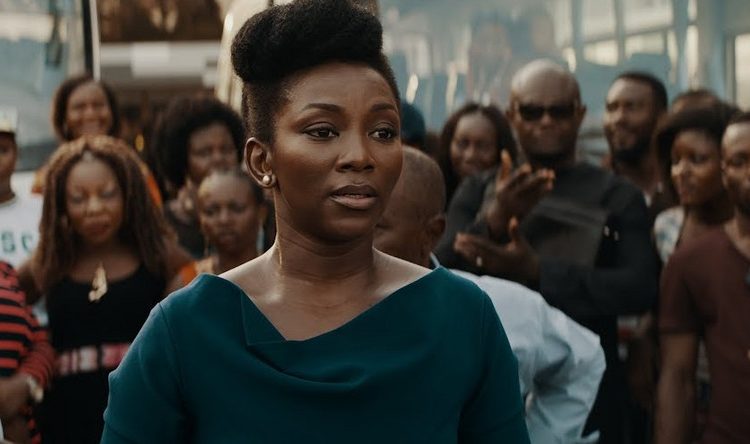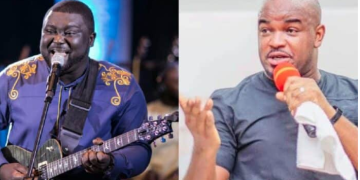“Delectable Nollywood actress, Genevieve Nnaji, looks astonishingly gorgeous as she steps out in a lovely attire to celebrate the World International Women Day. Despite being 39, and also having a child, she still remains hot and appealing to the eyes.” This is how Nigerian journalist Valerie Oke of Information NG describes brilliant filmmaker and actress Genevieve Nnaji.
Information NG’s “appreciation post” wasn’t a celebration of her recent internationally successful directorial debut, Lionheart. Nnaji wasn’t acknowledged as a female trailblazer of African cinema or congratulated on the film she directed, produced, co-wrote, and starred in being acquired as the first Nigerian Netflix Original. Information NG reduced her talents to misogynistic commentary and critique.
Too frequently this is the rhetoric surrounding Nnaji.
Genevieve Nnaji began as a child actor on Nigerian soap operas and commercials. She parlayed her commercial success into a prominent film career, becoming a leading face of Nollywood. For many households across the world, Genevieve is a one-name icon. Her influence spans outside of film, with lucrative endorsement deals, clothing lines, recording albums, and charities. Consistently, media coverage sidelines these praiseworthy accomplishments.
She’s unmarried, reportedly a single-mother, and a conventionally attractive 39-year-old African woman who identifies as feminist and uses her platform to speak about issues impacting Nigerian women and African women at large–all of which contribute to her sensationalized coverage. African media desperately tries to understand her through the narrow confines they’ve set for African womanhood. Yet, it’s Nnaji’s ability to appeal to Nigerian trophy wife fantasies while inserting controversial questions about culture, gender and society that make her the perfect vessel to transform Nigerian cinema.
Enter: Lionheart. More than Nnaji’s directorial debut, it’s a window into the experiences of professional Nigerian women. Lionheart does what many Hollywood films refuse to do; it portrays Africa as a modern, metropolitan space and centers around an agency-having African woman. While Africans have never waited or depended on Hollywood for representation, Hollywood’s choice still has degrading repercussions. The African Narrative Project conducted a content analysis of some 700,000 hours of US television, news, entertainment, and 1.6 million tweets. The results of this analysis highlight an implicit Africa bias. Some of the findings included:
One-third (35%) of Africa mentions in scripted entertainment was about crime. Only 13% of entertainment storylines that mentioned Africa included an African character, and 80% of those roles were small. When Africans did appear, 46% of the characters spoke ten words or less. Only 31% of African characters were women.
If the minuscule presence of African women on U.S. screens coupled with the absence of their voices even when physically present wasn’t problematic enough, the U.S. entertainment industry is globalized. That means it’s ignorant and biased representations of Africa and Africans are exported and treated as valid by consumers.
Enter: Nollywood. Its popularity is a testament to Africa’s rejection of biased Western representations. It has transcended Nigeria to gain large followings in other African markets and inspired the creation of other niche homegrown film industries. African movie-goers are choosing Nollywood and the African: characters, storytelling, direction, and production it provides with every film. While Nollywood places African representation in African hands, those hands are usually male, and it’s evident. Nollywood fails at treating women as complex, self-sustaining entities outside of their male characters.
Nollywood films were notorious for their problematic female tropes. As Adébólá Ráyò writes in VICE, “Women were either long-suffering and much-oppressed—in Living in Bondage, the heroine’s husband sacrifices her life to Satan in exchange for the wealth he dreams of—or calculating operators whose only goals were to get rich and get husbands, like the Glamour Girls.” In an industry where the female characters range from ‘human sacrifice’ to ‘gold digger,’ Nnaji brought into fullness of being the Lionheart character of Adaeze.
In Lionheart, Adaeze is the successor to a transport company owned by her father in Southeastern Nigeria. She is a smart, businesswoman fighting to save her family’s business. While she has a brother, she is the one who holds her father’s respect and a position on the company’s board of directors. The film centers around her. Viewers get to watch her work with her uncle as a partner, not an object or liability. She navigates everything from sexism and sexual harassment to the sense of duty and obligation towards familial and tribal communities. She experiences many of the complexities that shape life for Nigerian women. She sways between Igbo and English in ways authentic to Southeastern Nigeria. She has romantic connections, but they are not the focus of her storyline. Her struggles do not revolve around securing a husband or having children.
While most Nigerian women are not heir to large transportation companies, nor maneuvering billion-naira mergers like the character Adaeze, the script is grounded in women’s real-life experiences.
The film also excels in the ways it avoids familiar tropes of African representation. Lionheart depicts tribalism in a subtle and nuanced manner. It focuses on how it can shape allegiances and relationships while avoiding sensationalized violent ethnic conflicts, the Biafran War, and Boko Haram. With this approach, Lionheart effectively showcases Igbo culture and its intersections with Nigeria at-large.
Thankfully, Nnaji is not alone in her focus on nuance and complex stories. She is part of the growing community of Nigerian female filmmakers in an era many are calling ‘New Nollywood.’ Nnaji along with Kemi Adetiba, Tope Oshin Ogun, and Jade Osiberu are transforming female representation and African storytelling through their the cinematography, direction and writing.
So much of the conversation surrounding Lionheart focuses on what its acquisition by Netflix as a Netflix Original means. Will Netflix increase the Nollywood films and series available, or better yet will they fund more Nigerian Netflix Originals? Its acquisition has overshadowed the significance of the film. Lionheart demonstrates how to make a film about Africa, centered on African women, without utilizing the tropes of genocide, child soldiers or colonization. The real question should be, how will Hollywood and Nollywood grow from her example?
Photo caption: Genevieve Nnaji attends the ‘Lionheart’ premiere during 2018 Toronto International Film Festival at TIFF Bell Lightbox on September 8, 2018 in Toronto, Canada. (Photo by Presley Ann/Getty Images)
Source: shadowandact.com










